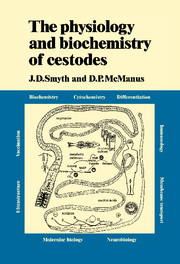Book contents
- Frontmatter
- Contents
- Preface
- Acknowledgements
- 1 The cestodes: general considerations
- 2 The adult cestode: special structural features relevant to its physiology
- 3 The adult cestode in its environment
- 4 The adult: general metabolism and chemical composition; lipid metabolism
- 5 The adult: carbohydrate metabolism
- 6 The adult: proteins and nucleic acids
- 7 The biology of the egg
- 8 Developmental biology of larvae
- 9 Development within definitive host
- 10 Cultivation of cestodes in vitro
- 11 Immunobiology of cestodes
- References
- Index
6 - The adult: proteins and nucleic acids
Published online by Cambridge University Press: 24 November 2009
- Frontmatter
- Contents
- Preface
- Acknowledgements
- 1 The cestodes: general considerations
- 2 The adult cestode: special structural features relevant to its physiology
- 3 The adult cestode in its environment
- 4 The adult: general metabolism and chemical composition; lipid metabolism
- 5 The adult: carbohydrate metabolism
- 6 The adult: proteins and nucleic acids
- 7 The biology of the egg
- 8 Developmental biology of larvae
- 9 Development within definitive host
- 10 Cultivation of cestodes in vitro
- 11 Immunobiology of cestodes
- References
- Index
Summary
Proteins
General considerations
Proteins are involved in a variety of cellular functions, including structural support, the formation of contractile systems and molecular transport. In addition, proteins can act as hormones, some are toxins, many are antigenic and the largest group, the enzymes, catalyse fundamental synthetic and degradation reactions in cells. Another very important group of proteins is the immunoglobulins (antibodies) (Table 11.1, p. 285); these combine specifically with antigens and are key components of the host immune response.
The total protein content of cestodes is lower than that of most invertebrates being generally between 20% and 40% of the dry weight (796), although values of over 60% have been reported for Echinococcus spp. (488, 498) (Table 4.1).
STRUCTURAL PROTEINS
Structural proteins are key components of cells but, despite the fact that they provide potentially important targets for chemotherapy, they have been little studied in cestodes. The reported structural proteins include sulphur-rich keratin (Fig. 7.7, p. 173), which makes up the hooks and embryophores in taeniid cestodes, and sclerotin (a quinone tanned protein) (Fig. 7.8, p. 173), a principal component of the egg shells of Pseudophyllidea and possibly other groups (Chapter 7). The most abundant structural protein in animals, collagen, has been characterised from larvae of Bothriocephalus scorpii and Nybelinia spp. (977) and from the cysticerus of Taenia solium (Cysticercus cellulosae) (885, 886).
- Type
- Chapter
- Information
- The Physiology and Biochemistry of Cestodes , pp. 114 - 155Publisher: Cambridge University PressPrint publication year: 1989



